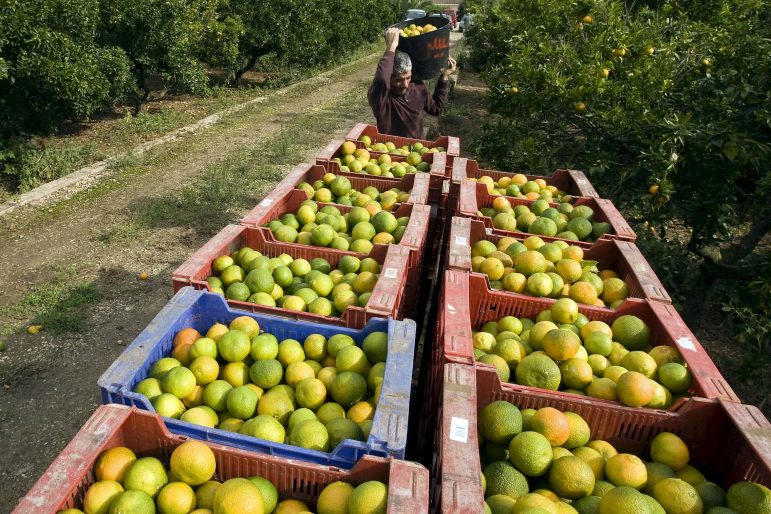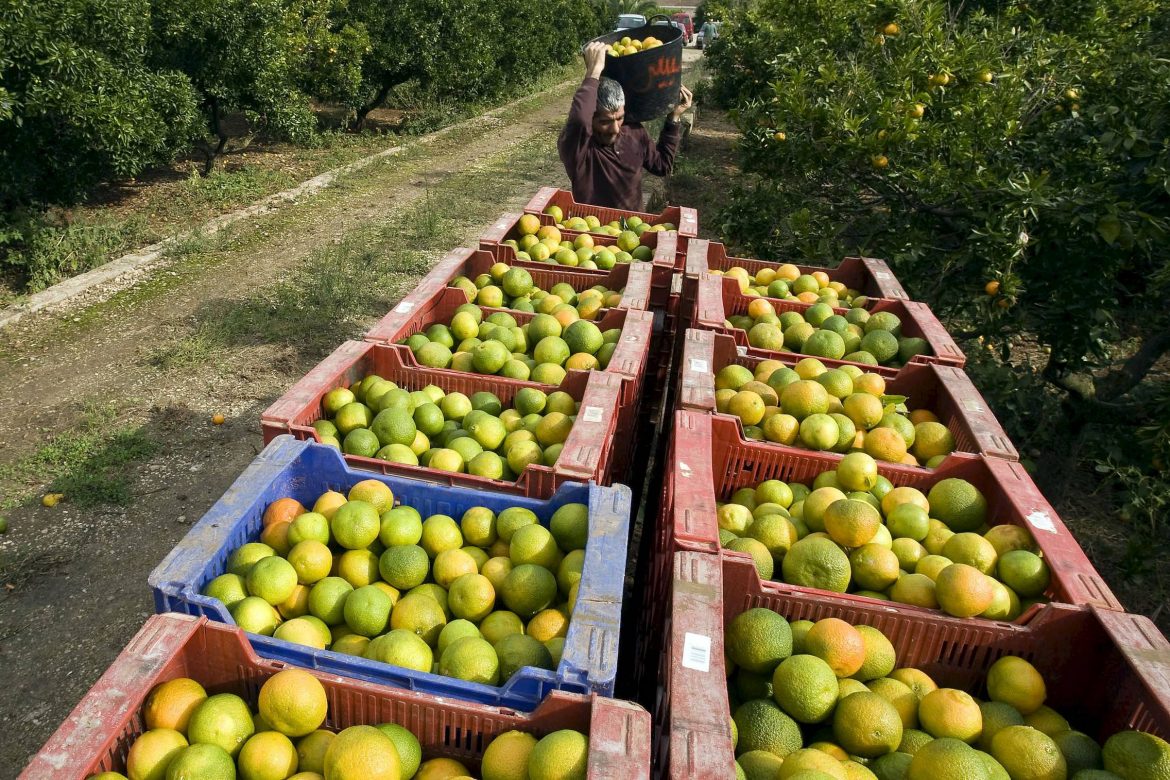
The death warrant of a pesticide rarely takes the form of a European regulation. However, later this week the European Commission will ask the Member States to ban chlorpyrifos and chlorpyrifos-methyl, two insecticides causing damages to the brains of foetuses and young children.
In what might be a last attempt, manufacturers are putting pressure to extend the authorisation of the two pesticides, documents obtained by Le Monde show. The current approval in the European Union will expire on 31 January 2020.
Representatives from Corteva, an American corporation, created from the merger of Dow, inventor of the product, and DuPont, told Commission officials back in January:
”Regulation should not be done on the basis of public pressure triggered by activists which do not trust the legal regulatory system but on sound evidence”, according to an internal report.
Fieldfisher, a law consultancy firm acting on behalf of Portuguese producer Ascenza, wrote in August to the Commission that the company was ”legitimately and truly surprised” by how the Commission had prepared the soon to be taken decision. This approach “is highly unusual, not to say irregular,” the lawyers wrote, adding it is “irreparably affecting the reputation of the Substance, thereby adversely affecting the Applicant’s commercial interests”.
In the same ballgame, lobbying firm EPPA wrote in October, complaining that the Commission had been pushed to ”over-react”, “guided by strong NGO and media pressure”.
Scientific community concerned in 15 years
While the Brussels NGO “activists” have indeed been active, they have not been isolated voices. The scientific community has also been concerned about the harmful effects of chlorpyrifos for more than 15 years.
In 2005 EU gave the green light to the insecticide for ten years. Shorty after, a study conducted by Columbia University (USA) on more than 250 children in the first three years of their lives showed that prenatal exposure to chlorpyrifos caused significant developmental delays.
Later studies documented the neurodevelopmental toxicity caused by chlorpyrifos: IQ deficits of up to seven points, reduced working memory, attention deficit disorders with or without hyperactivity, and autism spectrum disorders.
An international team of researchers estimated that exposure to organophosphate pesticides, among which chlorpyrifos, wipes out 13 million IQ points each year and causes 59,300 cases of intellectual disability in Europe.
In November 2018, Scandinavian scientists Axel Mie, Christina Rudén and Philippe Grandjean reported some crucial findings. The three researchers had managed to retrieve the full set of data from a study concerning the neurodevelopmental toxicity of chlorpyrifos, transmitted by Dow (now Corteva) to the EU in 1999 during the initial authorisation process. They found that the study was riddled with major anomalies. It showed unambiguously that chlorpyrifos damaged the brains of laboratory rats, contrary to what the conclusion stated.
Spain never analysed alarming study
However, the Member State known as the “rapporteur”, Spain, responsible for scrutinizing the manufacturers’ dossier, never analysed the study. The most worrying aspects of chlorpyrifos had thus never been evaluated by EU, as revealed by the team behind Chlorpyrifos – The Unknown Pesticide in June 2019.
On this background, the Commission decided to initiate an unprecedented procedure. In July 2019, whereas the European Food Safety Authority (EFSA), in charge of pesticides in the EU, had not yet completed its rounds of meetings to discuss Spain’s evaluation, the Commission asked the official Agency to urgently publish an interim statement on the effects of the insecticide on human health.
Published in the middle of the Summer break on 2 August 2019, the requested opinion was clear. EFSA pointed out the “potential” genotoxicity of chlorpyrifos – adverse effects on DNA that can cause cancer. Taking into account the Scandinavian researchers’ observations, published in the scientific journal ‘Environmental Health’, EFSA also highlighted the neurodevelopmental toxicity effects and concluded that the approval criteria applicable to human health were not met.
The same conclusion applied to chlorpyrifos-methyl, the two toxicological profiles being considered similar. In the EU, pesticides that are carcinogenic and toxic to reproduction must be withdrawn from the market.
Producer try to keep chlorpyrifos-methyl on the market
However interim it may have been, the verdict displeased the manufacturers. In a letter to the ”regulatory authorities of the EU Member States” dated 11 October 2019, Corteva insisted on the distinction between chlorpyrifos and chlorpyrifos-methyl. The latter was introduced later on the market and is therefore less studied. Neither are genotoxic, asserted Thomas W. Lyall, Regulatory and Stewardship Leader for Corteva in Europe, Middle East and Africa. There is ”no evidence of developmental neurotoxicity in animals or humans from either chlorpyrifos or chlorpyrifos-methyl”, Mr Lyall claimed.
In a footnote in the letter, Corteva yet acknowledged there had been an ”apparent reduction of cerebellum heights” of rats back in the study done in 1998 and sent to EU in 1999, as uncovered and pointed out by the Scandinavian scientists nearly two decades later. But, according to Corteva, this observation had ”no biological relevance”.
Finally, one last actor in this
coordinated lobbying effort entered the scene: COPA-COGECA, the
organisation defending the interests of the major players in the European agricultural
sector in Brussels.
Should the pesticides be taken out of the market, COPA-COGECA asked for a “sufficient grace period” for producers to make a transition. Otherwise, the withdrawal of the two insecticides “could significantly compromise European fruit and vegetable production”, as “there are no equally efficient alternatives”. The letter signed by Secretary General Pekka Pesonen thus seemed to ignore that the ban of chlorpyrifos in 9 countries had not lead to a collapse of fruits and vegetables production.
Memberstates to vote on chlorpyrifos and chlorpyrifos-methyl this week
All these letters from stakeholders have been forwarded to the Member States by the Commission. Now their representatives are expected to vote at the next meeting of the Standing Committee on Plants, Animals, Food and Feed (SCOPAFF) on 5th and 6th of December 2019.
While the ban on chlorpyrifos seems to be supported by a great majority of Member States, the destiny of chlorpyrifos-methyl is unclear. According to sources in, and outside, Brussels, Belgium, Denmark, Finland, France, Germany, Slovenia and Sweden have announced that they will vote for the non-renewal of chlorpyrifos-methyl. Greece, Italy, Portugal and Spain, as well as Poland, would be against a ban.
The outcome is nevertheless difficult to predict as it depends on which countries abstain from voting. For a qualified majority to be reached the yes-voters must represent 55 per cent of the member states and 65 per cent of the total population in the EU.
Except for Poland, an apple grower, the others “pro-methyl” countries are referred to as “citrus states”, where the insecticides are used. Grapefruits, lemons, oranges and mandarins were the fruits most contaminated by chlorpyrifos residues in 2016, according to official EU data analysed by NGO PAN Europe.
Spain, which produces more than half of the oranges in Europe, has also been the “rapporteur” Member State for the two pesticides since the beginning of the millennium. On the request from Spanish news website El Confidencial, the Spanish Agricultural Ministry declined to comment on the country’s role and position before the vote.
EU Commission is pressing for a total ban
The Commission seems determined to ban both insecticides. At the beginning of October, it notified the World Trade Organisation (WTO) on the impending decision, and set the maximum residue limits on imported products at the lowest possible level (0.01 mg/kg). The Commission assured it “will consider whether to convene the Appeal Committee” and override a possible absence of majority in the SCOPAFF.
“We strongly disagree with EFSA’s conclusions and the European Commission’s proposals for non-renewal. No active substance has been researched more thoroughly than chlorpyrifos”, wrote Corteva’s Corporate Communications Leader Véronique Marquès in an email. The company declined to comment on its intention to take the Commission to court should the two products be banned.
The second phase of the cross-border investigation on chlorpyrifos is led by Investigative Reporting Denmark, and made in collaboration with journalists from Knack in Belgium, Le Monde in France, VG in Norway, Newsweek in Poland, Oštro in Slovenia, El Confidencial in Spain, Süddeutsche Zeitung and Bayerischer Rundfunk (ARD) in Germany and The Midwest Center for Investigative Reporting in the US. The investigation is supported by Journalismfund.eu and Reporters in the field/Robert Bosch Stiftung.
EUobserver: Pesticide producers push back to halt EU ban
Le Monde: Chlorpyrifos : les fabricants contre-attaquent
Tagesschau.de: Chlorpyrifos: Endgültiges Aus für umstrittenes Pestizid?
Süddeutsche Zeitung: Reich an Vitamin C – und Gift
El Confidential: La industria presiona para que la UE no prohíba el pesticida más usado en España
Knack: Lobbyisten proberen omstreden pesticide chloorpyrifos te redden
Ostro: Škodljivemu pesticidu klorpirifosu so šteti dnevi

Pingback: L’Italia con la Spagna a favore del pesticida nemico dei bambini? | il Salvagente